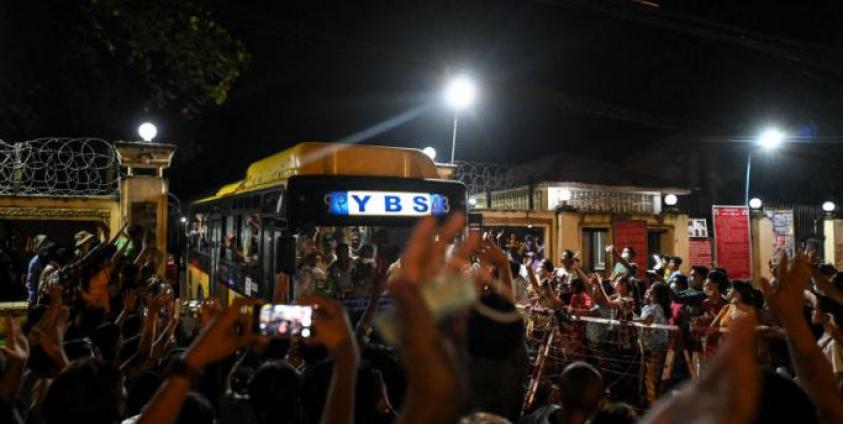Myanmar's junta chief Monday announced the release of more than 5,000 people jailed for protesting against a February coup, days after a regional bloc delivered a major snub to the military regime.
There has been chaos in Myanmar since the coup, with more than 1,100 civilians killed in a bloody crackdown on dissent and more than 8,000 arrested, according to a local monitoring group.
More than 7,300 are currently behind bars, according to the Assistance Association for Political Prisoners (AAPP).
Junta head Min Aung Hlaing said a total of 5,636 prisoners will be freed to mark the Thadingyut festival later in October, without providing details on when they would be freed.
The announcement comes on the heels of the Association of Southeast Asian Nations' decision to exclude Min Aung Hlaing from an upcoming summit of the 10-country bloc over his administration's commitment to defusing the bloody crisis.
Min Aung Hlaing gave no details on who would be included in the list and prison authorities did not respond to AFP requests for comment.
The Democratic Voice of Burma news website said three of its journalists, all held for around six months, had been freed.
Myanmar authorities released more than 2,000 anti-coup protesters from prisons across the country in June, including journalists critical of the military government.
Those still in custody include the American journalist Danny Fenster, who has been held since being arrested on May 24.
Mya Nu, who said her daughter was arrested in April, was one of dozens waiting outside Yangon's Insein prison after the latest announcement in the hope their loved ones would be among those set free.
"I didn't get a chance to meet her yet," she told AFP.
"It's only through her lawyer that I know she's in good health,"
More than 1,300 of those due to be released would be freed on the condition they sign agreements promising not to re-offend, according to the junta's Monday statement.
Such agreements were "basically a form of parole that entails constant menacing surveillance", David Mathieson, an analyst formerly based in Myanmar, told AFP.
"It doesn't absolve the SAC (State Administration Council, as the junta dubs itself) of nine months of extreme violence."
The AAPP monitoring group slammed the release as a "form of distraction" aimed at foreign governments.
"The intention is not to relax repression," it said in a statement posted on Twitter.
- Junta shunned -
Foreign ministers from the ASEAN bloc on Friday decided to exclude Min Aung Hlaing, instead choosing to invite a "non-political representative" for Myanmar to the October 26-28 summit.
The organization, widely criticised as toothless, took a stand after the junta rebuffed requests for a special envoy to meet "all stakeholders" in Myanmar -- a phrase seen to include ousted civilian leader Aung San Suu Kyi.
The junta slammed the decision, accusing ASEAN of breaching its policy of non-interference in the domestic affairs of member states.
Myanmar, mostly ruled by the military since a 1962 coup, has been a thorn in ASEAN's side since it joined in 1997.
Min Aung Hlaing's administration has justified its power grab citing alleged vote rigging in last year's elections, which Suu Kyi's National League for Democracy (NLD) party won convincingly.
The coup snuffed out Myanmar's short-lived dalliance with democracy and the 76-year-old Suu Kyi now faces a raft of charges in a junta court that could see her jailed for decades.
Last week, her chief lawyer said he had been banned by the junta from speaking to journalists, diplomats or international organisations.
The other lawyers on her legal team also faced a similar ban -- effectively muzzling the key sources of information on court proceedings, from which journalists are barred.
Nobel laureate Suu Kyi, who has spent much of her life resisting Myanmar's generals, is scheduled to testify in court for the first time later this month.







